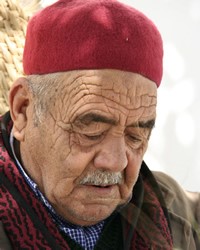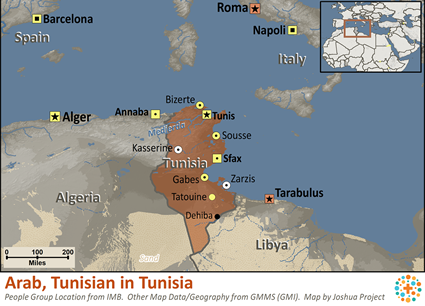Tunisia, the smallest country in North Africa, boasts beautiful views of the Mediterranean Sea to its north and vast expanses of the Sahara desert in its south. One can view beaches, mountains, rich farmland, and arid desert all in a few hours' drive. Ancient Phoenician, Roman, and Byzantine ruins attract tourists and archaeologists alike.
In the first few centuries after Christ, Christianity spread throughout North Africa. A strong church was established in present-day Tunisia despite intense persecution from the Romans. Ancient baptisteries and sites of martyrdom can be found among the ruins. However, disunity, factions, and a failure to translate the Bible into the local languages weakened the church. When Arab invaders arrived in the 7th century an empty shell of a church was all that existed. Islam spread rapidly and the Christian roots of the people were forgotten.
In 1956 Tunisia won its independence from France. Over the next 55 years, Tunisia only had two presidents and the people lived under repression and fear of the government. Tunisia was an Islamic state, but the former president had stifled most forms of extremism.
The atmosphere of Tunisia is very secular. Many Tunisians seldom or never go to a mosque. Women currently have more rights than in other Arab countries. Many women hold government offices and professional careers.
Agriculture, phosphate mining, and tourism dominate Tunisia's economy. What was once known as Rome's "bread basket" still produces delicious fruits, vegetables, and grains. Most farmers employ primitive farming methods. At the same time cell phones, Internet, and Facebook are changing the way Tunisians interact with and view the world.
Tunisian Arabs typically live in proximity to their extended families and place a high value on family. In general, they are friendly people, known for their hospitality.
Tunisia has a large youth population that is highly educated. Almost two out of every three Arabs are under the age of 30. Both the Middle East and North Africa have the highest youth unemployment on the planet. Frustration, lack of opportunity, and government corruption produced a revolution in January 2011 resulting in the president fleeing the country, regime change, and the Arab Spring (the ripples of Tunisia's revolution spread to Egypt, Libya, Yemen, Syria, and others).
In October 2011 Tunisia held its first democratic elections for representatives who will rewrite the constitution. It was reported that 54% of all Tunisians voted. Ennahda, the Islamic party, won the largest number of seats in the constitutional assembly. The party claims to be moderate, however it wants Islamic law to be the source of the nation's legislation.
Virtually all Tunisian Arabs are Muslim. While many are nominal Muslims, Islam heavily influences every aspect of Tunisian culture. Their religious practices include various ceremonies and festivals. They believe in jinn, spirits according to Muslim legend, capable of exercising influence over people. Witchcraft and worship at shrines are practiced and produce bondage and strong spiritual darkness.
In recent years, Christian media (websites, TV, and radio programs) has generated a great interest in Christianity. In addition countless testimonies have been shared where Jesus appeared to people through dreams and visions. There are currently a few hundred believers in the country. However, many of them live far from any other Christians and have no opportunity for fellowship and discipleship. Most Tunisians experience significant persecution from family and friends. They risk losing their jobs, losing their place in society, and pressure from the authorities.
Following the recent revolution, unprecedented access to the Gospel has produced a great need for more workers (nationals and foreigners alike) to meet with those who are seeking to know more about Jesus.
Ask God to strengthen, encourage, and protect the small number of Tunisian Arab believers.
Pray that Tunisian Christians would be impassioned to reach their own people, sharing a clear, succinct, and reproducible Gospel presentation.
Pray for completion of Bible translation in this people group's primary language.
Ask God to raise up teams of intercessors who will begin to faithfully stand in the gap for the Arabs.
Ask the Lord to raise up strong local churches among the Tunisian Arabs that will seek to rapidly multiply.
Pray that whole families would come to faith in Jesus together.
Pray for clear vision of what a simple, Biblical house church network in Tunisia will look like.
Pray for the Tunisian church to become known for strong discipleship and rapid incorporation of new believers.
Pray for strong national leaders to emerge and for these people to plant churches in every city and village in the nation.
Scripture Prayers for the Arab, Tunisian in Tunisia.
http://www.foreignpolicy.com
| Profile Source: Pray4Tunisia |


























